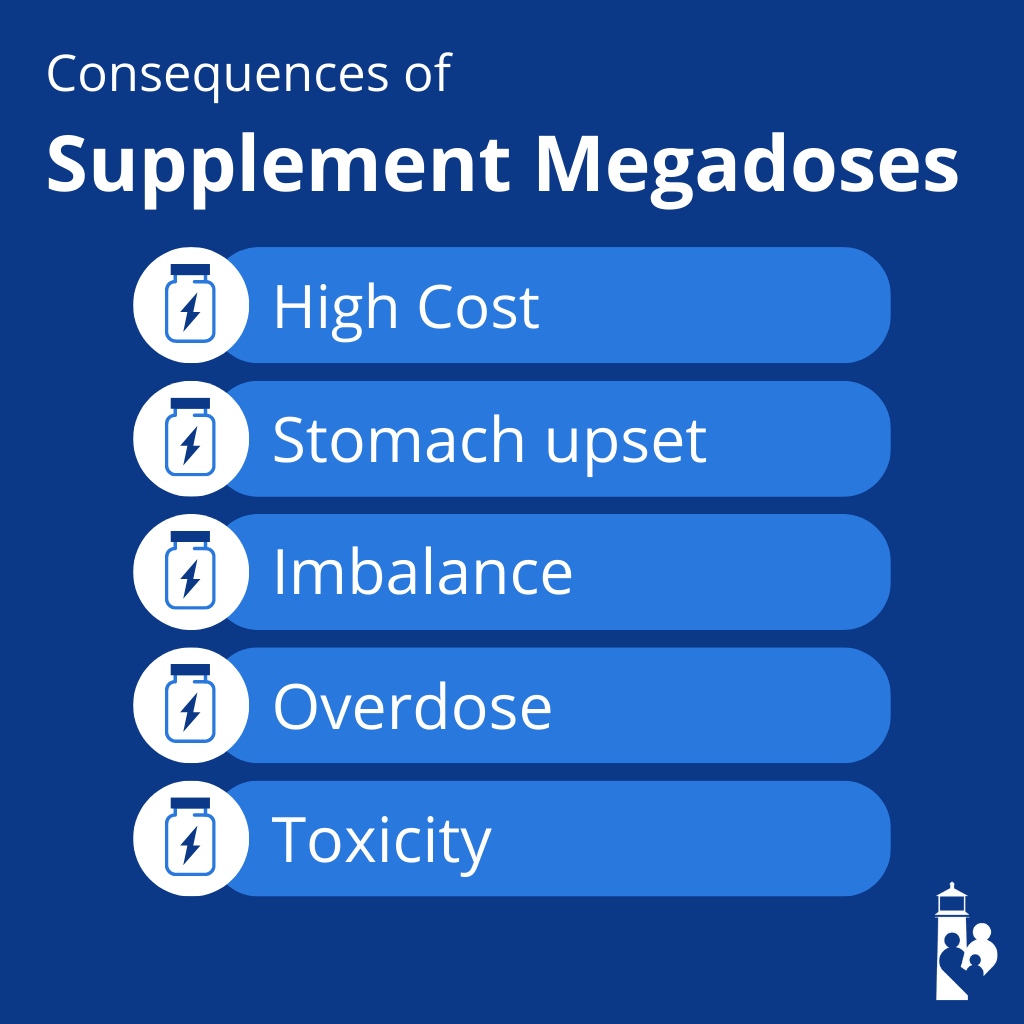
If you’ve been around this blog before, you probably know about the four pillars of health.
Each of the pillars — sleep, exercise, nutrition, and stress elimination — helps us navigate increasingly challenging obstacles to our health in today’s relentlessly high-paced world.
One such challenge is proper nutrition. Even if you eat healthy, whole foods, I’m afraid today’s fare is less healthy than it was even 50 years ago. From harmful conventional farming practices to long-haul transport of produce, we’re actually reducing the nutritive value of our foods before they ever reach our tables.
The problem further complicates itself. The vast majority of us also don’t eat the quantity of these not-as-good-as-they-used-to-be foods that we need to be healthy. Instead, we’re filling up on highly processed convenience foods that not only don’t nourish us, but also lead to perpetual inflammation.
This being the case, most people today can benefit from supplementation with a good multivitamin. In a previous post, I delved into the importance of finding reputable vitamin sources.
However, today I want to talk about a trend I’ve noticed in the supplement world: taking megadoses of vitamins.
What’s a Vitamin Megadose?
Vitamins, as you likely know, come with recommended daily allowances (RDA) attributed to them. RDAs originated in the 1940s and essentially tell us how much of a given vitamin human bodies need to prevent an illness from developing.
Sometimes we do need a larger amount of a particular vitamin or mineral to correct a specific issue. In such cases, a knowledgeable physician can evaluate an individual’s illness, blood work, and other factors to prescribe a specific supplement at a higher dosage. Because it occurs under the direction and supervision of a medical professional, I call this a pharmacologic dose.
The problems with high-dose supplementation start when people begin treating themselves without a knowledgeable doctor in the picture. This can occur accidentally due to overlap among supplements, or it can be intentional. Since supplements are readily available over the counter and seem like a more natural solution, people don’t hold as much caution for them as they do for medications.
However they occur, these kinds of high-dose supplementation are what I’m referring to as megadoses.
Far from being a good idea, taking megadoses of vitamins or minerals can actually cause illness or, at times, toxicity.
Consequences of Taking Megadoses of Vitamins
It might seem strange, but in the case of vitamins more does not necessarily equal better. Too much of a good thing is definitely an issue when it comes to vitamin dosages.
There are potential short and long-term consequences of taking too much of a single supplement.
For example, many people have heard about the role zinc, a vital mineral, plays in immune function. However, too much zinc undeniably causes problems in both the short term (abdominal pain, nausea, constipation, ulcers) and the long term (low copper levels, anemia, eventual osteoporosis).
On the vitamin front, too much vitamin A can also cause problems, such as headaches, dizziness, and coordination problems.
Besides overdose and toxicity, there are other potential consequences of taking too many different, unnecessary supplements:
- Cost. Supplements can get expensive. In fact, some doctors refer to high doses of water-soluble supplements as “expensive urine.” When the body has more of a water-soluble vitamin than it needs, it simply eliminates the excess via urination.
- Stomach symptoms. Generalized upset stomach can also result from taking megadoses of vitamins as the gastrointestinal system struggles to handle all the excess thrown its way.
- Imbalance. The body thrives off of balance, and excessive, unnecessary supplementation throws that balance out of whack, bringing in dysfunction. For example, maybe you’ve heard that omega-3 fatty acids are good for your health — and they are. But too many omega-3s throw off the balance in your body, pushing out the omega-6 fatty acids and leading to unhealthy cell membranes.
Our bodies know how to use nutrients in concert with each other, and that balance is important to protect. If we meddle with it by bombing our systems with megadoses of certain vitamins, we’ll feel the consequences at some point.
If it’s not necessary to take, then it’s necessary not to take.
The Best Sources for Vitamins and Minerals
When we’re separating out our nutrients and trying to orchestrate them all artificially, the whole thing becomes harder to balance. Bodies are brilliant, so they often still figure it out. But if you give your body too much of one thing, it throws off all those other reactions that are vital for proper function.
While I’m in favor of a high-quality multivitamin, and even of pharmacologic dosing under a doctor’s supervision, the very best way to get our nutrition is through food. Fruits and vegetables are the ultimate multivitamin.
Food is complex in all the right ways. Its components — fiber, vitamins, and minerals — work together for us in a complex, beneficial harmony. We just can’t do it as well as nature.
Taking Megadoses of Vitamins: Final Thoughts
We wouldn’t begin taking prescription medications (if we could get them) at our own discretion. Though easier to access, megadoses of supplements rest firmly in a similar pharmacologic category.
If you’re interested in supplementation, I strongly advise working with a doctor who’s well-versed in this type of medicine. They can help you determine whether pharmacologic supplementation is advisable and necessary in your case, or whether a dietary change, higher-quality multivitamin, or other path makes the most sense.

Dr. David Rosenberg
Dr. Rosenberg is a board-certified Family Physician. He received his medical degree from the University of Miami in 1988 and completed his residency in Family Medicine at The Washington Hospital in Washington, Pennsylvania in 1991. After practicing Emergency Medicine at Palm Beach Gardens Medical Center for two years, he started private practice in Jupiter, in 1993. He is an avid baseball fan and Beatles fanatic, since he was 8 years old. He has been married to his wife, Mary, since 1985 and has three grown children.
David completed additional studies at Mercer University, Macon, Georgia and obtained a BS in Chemistry in 1983.
“My interests include tennis, snow skiing, Pilates and self-development.”


